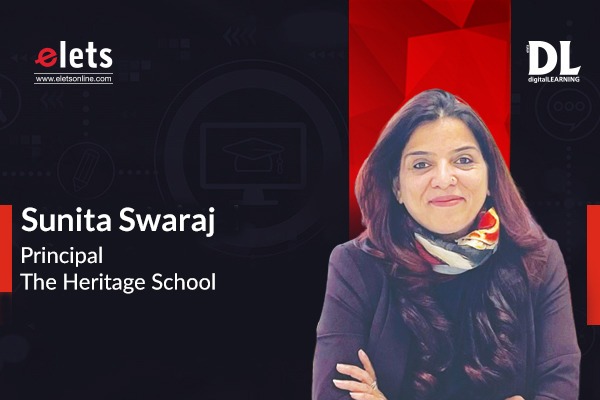
The education realm always welcomes new technological advancements with open arms. Even our NEP 2020 talks about AI as a vital tool in the teaching-learning process. AI innovations are inevitable in the coming years. Though it is a great aid in the education sector, it comes with certain flaws when one talks in context to the creative space of the human brain and efficiency shared, Sunita Swaraj, Principal, The Heritage School, Vasant Kunj, New Delhi in an exclusive conversation with Sheeba Chauhan of Elets News Network. Edited excerpts:
The emerging edtech has gained immense success in the education space but the ride has seen many bumps in between. How do you see the changing landscape of the edtech industry and will it impact the school education ecosystem?
The changing landscape of the edtech industry is bound to have a tremendous impact on the education ecosystem. Some significant changes are the shift towards personalised, interactive, engaging learning experiences. This has the potential to improve student outcomes and engagement by tailoring instruction to each student’s learning needs. Another trend in this industry is the use of immersive technologies like Virtual and Augmented Reality. However, there are concerns about data privacy and security, the quality of online content, and the digital divide. Hence, educators, policymakers, and edtech companies need to work together to ensure that these changes are equitable, effective, and sustainable.
What are your thoughts on the usage of AI tools like ChatGPT, Bard, etc for creating content and various other uses? Do you think it will hamper the quality of education in the long run?
The education realm always welcomes new technological advancements with open arms. Even our NEP 2020 talks about AI as a vital tool in the teaching-learning process. AI innovations are inevitable in the coming years. Though it is a great aid in the education sector, it comes with certain flaws when one talks in context to the creative space of the human brain and efficiency. It cannot survive human’s ability to coordinate, cooperate and coexist. Interview Questions for Sunita Swaraj, Principal, THE HERITAGE SCHOOL It is crucial to address these challenges ethically and equitably.
Recently, the government of India emphasised the importance of the native language for better understanding. What are your thoughts on this? Do you plan to incorporate the same at your school in near future?
Our native language is our identity. Like we preserve and cherish our things, it is also our duty to preserve our identities. Our native language connects us with our people. Not only that, learning in native languages will build a strong connection with our long-drawn history of our culture in a better way. Moreover, if our native languages are incorporated in our schools, the learners will have a better understanding about the content. Also, it would be easier for learners to survive in their native region. Hence, it will be a great move by the government to incorporate native languages in schools.
(According to the economic survey 2022-23, enrollment at the pre-primary level decreased from 1.1 crores [11 million] in 2021 to 1.0 crores [10 million] in 2022. Your comments on the same.
Pre-primary education is a crucial stage of a child’s development, and it plays an essential role in laying the foundation for future learning. There are varied factors responsible for the alarming decline in the enrolment at the primary-primary levels. One of the leading problems is lack of teaching staff and proper infrastructure. Other reasons could be separation anxiety, communication challenges, making friends and personal attention by the teacher. It is essential to address these challenges by creating awareness among parents, providing subsidies or scholarships to low-income families and ensuring quality standards so that all children have access to quality pre-primary education.
Recently, Education Minister launched The Yuva Sangam portal which will concentrate on organising youth-exposure tours for students from North Eastern States to other states and vice versa. How do you think such initiatives are going to develop multicultural education in Indian students?
The Yuva Sangam portal, which facilitates student exchange programs between North-Eastern and other Indian states, can significantly impact the development of multicultural education in Indian students. Exposure to varied cultures, lifestyles, and languages can broaden students’ perspectives and increase their tolerance for diversity. Initiatives like these can help students appreciate India’s cultural heritage and interact with people from different backgrounds. Such programs can also improve social and communication skills, build networks, and prepare students for a diverse world. Overall, the Yuva Sangam portal plays a crucial role in promoting multicultural education, fostering national integration, and enhancing the career prospects of students.






















